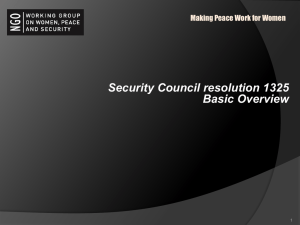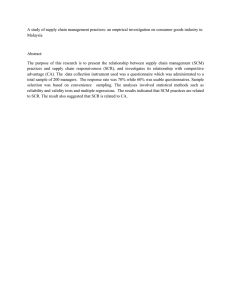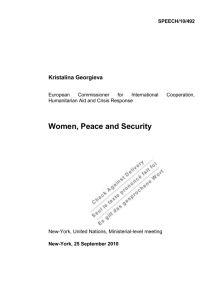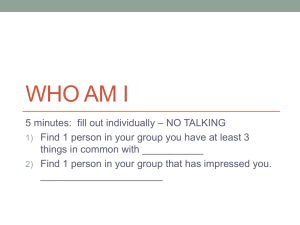Reluctant Baby Steps Towards Enhanced Global Security: UN SCR 1325 and the UN Security Council s work on the protection and promotion of women s rights
advertisement
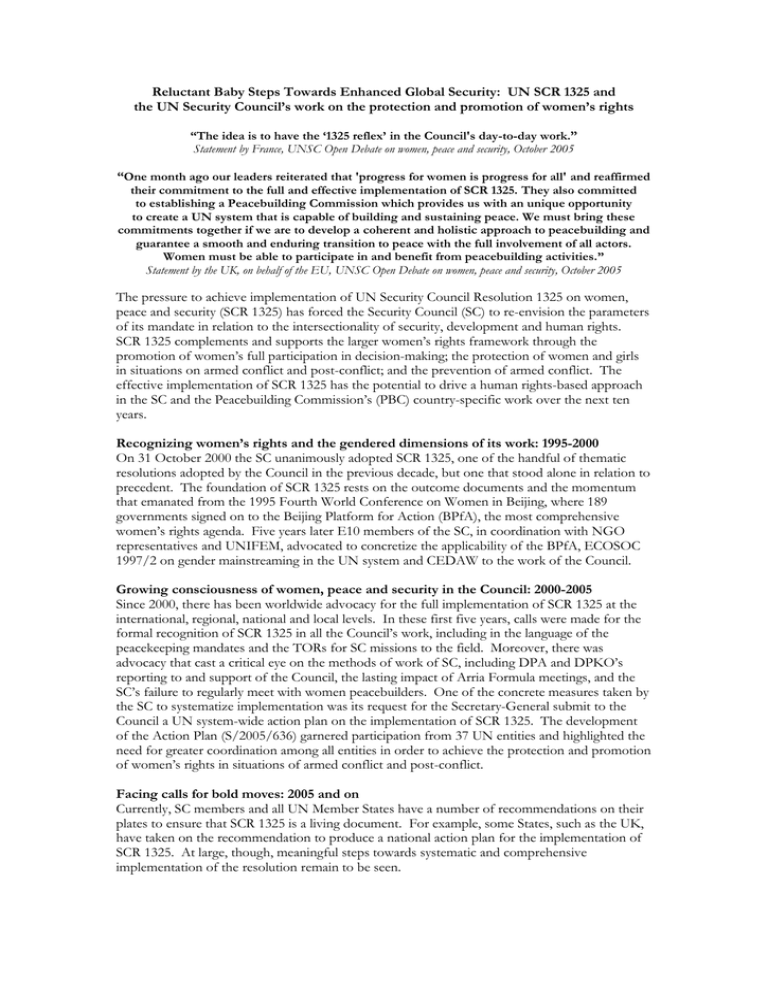
Reluctant Baby Steps Towards Enhanced Global Security: UN SCR 1325 and the UN Security Council’s work on the protection and promotion of women’s rights “The idea is to have the ‘1325 reflex’ in the Council's day-to-day work.” Statement by France, UNSC Open Debate on women, peace and security, October 2005 “One month ago our leaders reiterated that 'progress for women is progress for all' and reaffirmed their commitment to the full and effective implementation of SCR 1325. They also committed to establishing a Peacebuilding Commission which provides us with an unique opportunity to create a UN system that is capable of building and sustaining peace. We must bring these commitments together if we are to develop a coherent and holistic approach to peacebuilding and guarantee a smooth and enduring transition to peace with the full involvement of all actors. Women must be able to participate in and benefit from peacebuilding activities.” Statement by the UK, on behalf of the EU, UNSC Open Debate on women, peace and security, October 2005 The pressure to achieve implementation of UN Security Council Resolution 1325 on women, peace and security (SCR 1325) has forced the Security Council (SC) to re-envision the parameters of its mandate in relation to the intersectionality of security, development and human rights. SCR 1325 complements and supports the larger women’s rights framework through the promotion of women’s full participation in decision-making; the protection of women and girls in situations on armed conflict and post-conflict; and the prevention of armed conflict. The effective implementation of SCR 1325 has the potential to drive a human rights-based approach in the SC and the Peacebuilding Commission’s (PBC) country-specific work over the next ten years. Recognizing women’s rights and the gendered dimensions of its work: 1995-2000 On 31 October 2000 the SC unanimously adopted SCR 1325, one of the handful of thematic resolutions adopted by the Council in the previous decade, but one that stood alone in relation to precedent. The foundation of SCR 1325 rests on the outcome documents and the momentum that emanated from the 1995 Fourth World Conference on Women in Beijing, where 189 governments signed on to the Beijing Platform for Action (BPfA), the most comprehensive women’s rights agenda. Five years later E10 members of the SC, in coordination with NGO representatives and UNIFEM, advocated to concretize the applicability of the BPfA, ECOSOC 1997/2 on gender mainstreaming in the UN system and CEDAW to the work of the Council. Growing consciousness of women, peace and security in the Council: 2000-2005 Since 2000, there has been worldwide advocacy for the full implementation of SCR 1325 at the international, regional, national and local levels. In these first five years, calls were made for the formal recognition of SCR 1325 in all the Council’s work, including in the language of the peacekeeping mandates and the TORs for SC missions to the field. Moreover, there was advocacy that cast a critical eye on the methods of work of SC, including DPA and DPKO’s reporting to and support of the Council, the lasting impact of Arria Formula meetings, and the SC’s failure to regularly meet with women peacebuilders. One of the concrete measures taken by the SC to systematize implementation was its request for the Secretary-General submit to the Council a UN system-wide action plan on the implementation of SCR 1325. The development of the Action Plan (S/2005/636) garnered participation from 37 UN entities and highlighted the need for greater coordination among all entities in order to achieve the protection and promotion of women’s rights in situations of armed conflict and post-conflict. Facing calls for bold moves: 2005 and on Currently, SC members and all UN Member States have a number of recommendations on their plates to ensure that SCR 1325 is a living document. For example, some States, such as the UK, have taken on the recommendation to produce a national action plan for the implementation of SCR 1325. At large, though, meaningful steps towards systematic and comprehensive implementation of the resolution remain to be seen. I align myself with those SCR 1325 advocates who purport that implementation of the resolution- in letter and spirit- will enhance the substantive human rights basis of the Council’s work. Further, the process of implementation will continue to improve the working methods of the SC through the promotion of civil society participation in the work of the Council and the encouragement of Council’s working interdependently with the rest of the UN system. Ultimately, the implementation of SCR 1325 can have a transformative impact on the international community’s debates on security matters, including terrorism, nuclear weapons and protection of civilians, leading us towards the prevention of armed conflict and sustainable development and peace. Contact: Kara Piccirilli LLM in Human Rights Law, Candidate, 2006 University of Nottingham, UK email: kara.piccirilli@gmail.com mobile: 07726713278 About the author: From 2002-2005 the author served as Project Associate for the PeaceWomen Project of the Women’s International League for Peace and Freedom (WILPF)-UN Office in New York City. The PeaceWomen Project monitors and works toward rapid and full implementation of United Nations Security Council Resolution 1325 on women, peace and security. WILPF is a member of the NGO Working Group on Women, Peace and Security and an observer member of the UN Inter-Agency Taskforce on Women, Peace and Security. For more information visit www.PeaceWomen.org.
